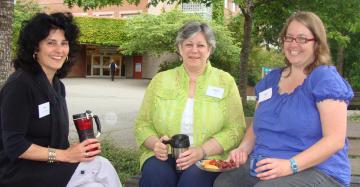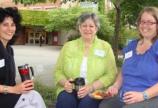Building leaders for the social economy and civil society
- Christine McLaren

“Communities and societies are grappling with many challenges in a rapidly changing world,” says Lynne Siemens, professor and graduate advisor in the School of Public Administration. “Addressing them requires new leadership and ways of working with individuals, communities, organizations and governments.”
The challenges ahead for communities, indeed for human society and the planet, require leveraging the best of what citizens and community leaders bring to the table. This is what UVic’s new Master of Arts in Community Development (MACD) program is intended to do, not just within British Columbia, but around the world.
The program, offered by the School of Public Administration, has just welcomed its first cohort of students, eager to develop their careers and contribute more effectively to the social economy and civil society.
What do these buzz words mean? They refer to the third sector—the non-profit, co-operative, non-governmental (NGO) people-centered economy—and address issues that impact communities such as food security, climate change, income disparity, lack of affordable housing, and support for the most vulnerable in our community.
The part-time master’s program was developed in collaboration with practitioners from the non-profit, co-operative, and community economic development sectors. It is delivered primarily online with three 10-day residential periods based at the University of Victoria. Students are able to study where they live and work while they learn through a variety of participatory methods including experiential learning, site visits and online dialogue.
“This program will provide opportunities to expand the scope of things I can do in my workplace and allow me to learn from people who understand the challenges of working in the non-profit sector,” says Stacy Chappel, current student and executive director of the UVic Grad Students Society.
The program is designed and delivered in collaboration with practitioners and scholars from across the university, including the faculties of human and social development, business, social sciences, humanities, and education, as well as research units such as the Office of Community-based Research and the Centre for Co-operative and Community-based Economy. It also includes collaborations and partnerships that the school and university have with organizations such as the Canadian Centre for Community Renewal, the BC–Alberta Research Alliance on the Social Economy, British Columbia Co-operative Association and the Centre for Non-profit Management.
“The courses are grounded in real experiences at the community level. Our course developers and instructors are themselves active in communities as leaders and researchers,” says Herman Bakvis, acting director of the School of Public Administration.
“I have looked at many different programs but the MACD content and multidisciplinary themes made the most sense to me, given my work experience and background,” says Carolyn Fast, executive director of the Victoria Women’s Transition House Society. “I believe the things I am learning in the program will have a positive impact on my leadership role.”
More information: http://publicadmin.uvic.ca/macd

